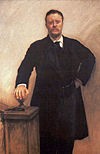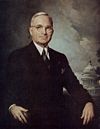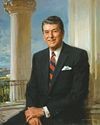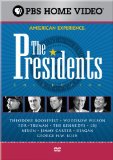| Reviews & Columns |
|
Reviews DVD TV on DVD Blu-ray 4K UHD International DVDs In Theaters Reviews by Studio Video Games Features Collector Series DVDs Easter Egg Database Interviews DVD Talk Radio Feature Articles Columns Anime Talk DVD Savant Horror DVDs The M.O.D. Squad Art House HD Talk Silent DVD
|
DVD Talk Forum |
|
|
| Resources |
|
DVD Price Search Customer Service #'s RCE Info Links |
|
Columns
|
|
|
Presidents Collection, The
I've watched about half the shows so far, and it's consistently excellent, often superb, and never less than engrossing. The shortest program (on Jimmy Carter) runs 162 minutes, more than two-and-a-half hours long, while the Truman and FDR shows are more than four-and-a-quarter hours (257 minutes) apiece, so they cover an awful lot of territory in detail.
The format is largely the same from show-to-show. Typically they'll open with a defining point in one president's history, or maybe a reflection on a childhood image or event that helped define who they became, and then this gives way to a leisurely recap of the subject's presidency and essential legacy.
This is followed by standard biographical material, usually with the first half consisting of events leading up to each subject's presidency, and maybe a year or two into their first (and sometimes only) term. The second half follows them through the end of their administration(s) and later life.
Several things about the shows surprised me. You'd think episodes covering the earlier presidents would be hard-pressed for film clips, photographs, surviving family friends and relatives for interview subjects, but obviously the programs had largely unfettered access to and cooperation from the presidential libraries and other archives. Also, looking FDR especially, one realizes that most presidents came from highly privileged backgrounds, where their families enjoyed constant photographic documentation, huge scrapbooks were kept from infancy, and so on. No one was living out of their suitcase. In Franklin Roosevelt's case (and, for that matter, Eleanor's early life as well), it's amazing just how much material survives even from the 1910s.
Another endlessly fascinating facet of these shows is, whether Republican or Democrat, the kind of consistent basic personality that emerges. If, for instance, being a beauty pageant contestant necessitates a combination of conceitedness and self-involvedness, becoming a U.S. President requires an almost Herculean tenacity, arrogance and narcissism.
Contrary to what you might expect, some of the best shows are about the "failed" presidencies of Carter and Bush, Sr. Carter's failure to work with even his own party in congress, the enormous debt he inherited from Vietnam, and other factors overshadowed some major accomplishments virtually forgotten in the wake of the Iran Hostage Crisis. And the show details the common assessment of Carter today: mediocre president / great ex-president, maybe the greatest since John Quincy Adams.
The Bush Sr. show is also something of a revelation, a sympathetic portrait of a bona fide war hero and indefatigable family man capable of extraordinary tenderness (in sharp contrast to Ronald Reagan, the fake, Hollywood hero and emotionally distant husband and father) casually willing to sell out his principals in the name of political ambition or expediency.
Indeed, the Carter and Bush shows exemplify the set's value not only as encyclopedia-like historical documents, but also as uncanny reflections of recurring patterns in elections and presidencies. Just as in 2008 Republicans are attempting to lure racist Democrats unwilling to vote for a black man (with few actually saying so), these shows demonstrate how Bush Sr. at the beginning of his career found early successes as a Republican in then-solidly Democratic Texas by bringing into the fold racist Democrats unhappy with the civil rights reforms of Lyndon Johnson. Once elected, Bush went his own way, angering many of his constituents, but when he ran for president, he did exactly the same thing. Carter, too, coddled the pro-segregationists in Georgia when he was running for governor, then turned around and supported Johnson.
You think Barack Obama or Sarah Palin is inexperienced? Watch Jimmy Carter's rise to power. Carter was a peanut farmer going door-to-door preaching the Gospel of Christ barely 15 years before becoming President of the United States.
The set has some notable omissions. Apparently the only other presidents covered by the show thus far are John Adams, Abraham Lincoln, and Ulysses S. Grant, which is why people like Dwight D. Eisenhower and Gerald Ford are excluded. (I'd really like to see a program on Warren G. Harding, as his famously corrupt administration has many parallels to modern times.)
In choosing to explore life and career highlights in depth rather than attempt covering absolutely every aspect of a president's life, there are curious omissions in every show, some rather glaring. For instance, the name "Dan Quayle" (Bush's famously inept and unqualified Vice President) is never uttered in the Bush Sr. show and he only briefly glimpsed, while the FDR show goes into considerable detail about FDR's campaign for the Vice Presidency during the 1920 Election - without once mentioning the top of the ticket (James M. Cox for you trivia buffs out there.)
The shows on Carter, Reagan, and Bush walk a political tightrope in discussing their tarnished legacies. Generally though they're quite honest, and possibly because the length of each program allows for strong, three-dimensional portraits balancing their failings with their histories and accomplishments, no matter your political persuasion one is likely to walk away even from the most disagreeable presidents with a new measure of understanding, if not sympathy.
Video & Audio
The Presidents Collection covers a lot of ground in terms of video. Wilson, FDR Truman, The Kennedys, and Reagan are 2-disc shows, each single-sided, dual-layer, while the others are confined to a single disc. Theodore Roosevelt, FDR Truman, The Kennedys, LBJ, Nixon, and Reagan are older shows in 4:3 full screen, while Jimmy Carter and George H.W. Bush are 16:9 enhanced widescreen. Finally, Woodrow Wilson is letterboxed, but not enhanced for some reason. All the shows are in 2.0 stereo except for George H.W. Bush which has 5.1. The video quality is at a level comparable to other shows from its respective era, but generally the newer the show, the better it looks and sounds. All are closed-captioned.
Extra Features
Every show except for Woodrow Wilson comes with a PDF Teacher's Guide, but only Woodrow Wilson and The Kennedys come with much in the way of additional supplements.
Woodrow Wilson offers viewers the option of watching an Enhanced Version with 90 minutes of additional video. There also Interviews with filmmakers and scholars, a photo gallery, a World War I Poster Gallery, and A Scholars' Forum on Wilson's Legacy.
The Kennedys include JFK's Hidden Life: An Interview with Historian Robert Dallek, An Unfinished Life: John F. Kennedy, 1917-1963, and a very useful Kennedy Family Tree.
Parting Thoughts
The Presidents Collection isn't cheap but it's nearly as valuable and useful as a sturdy set of encyclopedias. I'm enjoying wading through it on my own, but also look at it as a kind of investment my family hopefully will get some additional use out in the coming years. As a dense, entertaining resource of 20th Century History, this is a DVD Talk Collectors Series Title.
Film historian Stuart Galbraith IV's latest book, The Toho Studios Story, is on sale now.
|
| Popular Reviews |
| Sponsored Links |
|
|
| Sponsored Links |
|
|
| Release List | Reviews | Shop | Newsletter | Forum | DVD Giveaways | Blu-Ray | Advertise |
|
Copyright 2024 DVDTalk.com All Rights Reserved. Legal Info, Privacy Policy, Terms of Use,
Manage Preferences,
Your Privacy Choices | |||||||

















